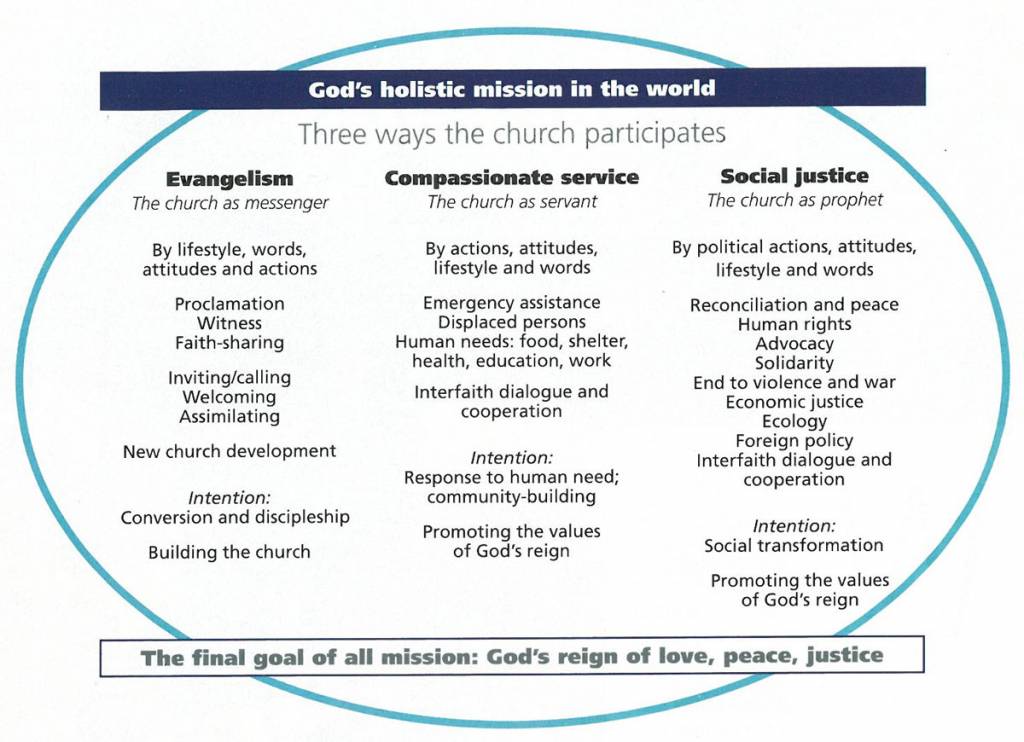Reluctant evangelists?
Telling the Good News may not come easy, but it is an essential part of a Christian lifestyle.
By Sherron Kay George | Presbyterians Today

Illustration by Anita DuFalla
Do Presbyterians still believe in evangelism? I quickly discovered in the required class on mission and evangelism I taught at Austin Presbyterian Theological Seminary that many students had little interest in or even an aversion to evangelism. Isn’t that something Baptists, Pentecostals, megachurches, and TV evangelists do?
We Presbyterians station smiling greeters at the front door, and we may take bread to visitors. We may invite someone to our church. But we generally do not feel comfortable speaking publicly about our personal faith.
Presbyterian pastors do not often preach evangelistic sermons or give altar calls, and door-to-door evangelism is rare among Presbyterians. Is there a way to practice evangelism without emotional manipulation and aggressive marketing techniques that lead to superficial decisions? Can Presbyterians reclaim with integrity our historical commitment to evangelism?
Evangelism is one part of God’s mission
Many Presbyterians are confused about the relation between mission and evangelism. The word missioncomes from the Greek for “sending,” and evangelism from “good news” or “public messenger of good news.” God is at work in our troubled and broken world. This is good news!
What is God doing in this world where many forms of devastating evil are rampant? God sent the Son and the Holy Spirit and now sends the church into the world as instruments of redemptive mission. God is bringing to fruition the new reality that was manifested in the life, ministry, death and resurrection of Jesus Christ — God’s reign of life, love, justice and peace. While this reign seems hidden, it is present like yeast, light, salt and a small seed.
Jesus defined the mission of God’s reign: “The Spirit of the Lord … anointed me to bring good news to the poor. He has sent me to proclaim release to the captives and recovery of sight to the blind, to let the oppressed go free, to proclaim the year of the Lord’s favor” (Luke 4:18-19).
God’s “holistic” or total mission activity includes three essential areas, all high priorities for the PC(USA): evangelism, compassionate service and social justice (see table below). Jesus practiced and intermingled all three. Each is a distinct and necessary part of God’s mission. If any area is neglected, the church’s mission is truncated.

Lives speak louder than words
All evangelism is mission, but not all mission is evangelism. Evangelism, compassionate service and social justice are integral to the Christian’s lifestyle. Our lives speak louder than our words and are the first Bible many people will read. The attitudes of respect, compassion and humility should characterize our evangelism and all other participation in God’s mission. While words are necessary at some point in evangelism, our deeds, attitudes and lifestyle help or hinder evangelism.
The specific intention of evangelism, compassionate service and social justice is an important distinctive of each. Building the church through conversion and discipleship is the intention of evangelism, while service and justice seek primarily to promote the values of God’s reign — although there are many overlaps. With integrity we can consider responding to human need, building sustainable community, and social transformation as intentions of mission. However, the ultimate end of every kind of mission activity is the consummation of God’s reign, where Jesus Christ is Lord of all forever.
Evangelism in an interfaith context
Sometimes we engage in social service and justice without speaking about Jesus or the church, and this is advisable in interfaith cooperation endeavors. For example, when people of diverse faith communities who belong to Austin Area Interfaith Ministries cooperate in ministry to the homeless or advocacy in public places on behalf of justice issues, they do not practice verbal evangelism. On the other hand, when members of a congregation help a family renovate their home or take food to flood victims, they should spell out who they are and why they are doing it, and evangelism is intertwined.
Words are helpful to explain why we practice compassionate service and social justice. When people ask us questions about the Christian faith or our view on ethical issues, we must be ready to answer with bold humility and in clear non-technical language.
Presbyterians believe both in cooperation or dialogue with and in evangelism or witness to people of other faiths. Mission workers in Muslim countries practice mission through compassionate service and community cooperation, but must be reticent in relation to evangelism because of government prohibitions. Christians in China testify that a major reason for the amazing growth of the church during the repressive Cultural Revolution was the “silent witness” of compassionate and honest Christians in daily life.
Dialogue presupposes the faith commitment of all parties, so we need not hide or compromise what we believe. We can openly share our belief in Jesus and respectfully listen while others share their beliefs in order to learn from one another. We witness evangelistically and invitationally only as we discern that the Spirit is opening doors and preparing hearts to respond to God’s gift of salvation in Jesus Christ.
Sharing good news — every Christian’s responsibility
Every person in the world has the right to hear and respond to God’s universal offer of grace in Christ. And sharing this good news is the responsibility of every Christian and the church as a whole. Christians in every country around the globe have the privilege of joyfully sharing the good news of the whole gospel with their friends, relatives, acquaintances, neighbors and colleagues.
Salvation is a gift of grace that God freely gives, but God chooses to communicate and offer this gift through human agents. We simply take advantage of opportunities to articulate and explain our personal faith in Jesus Christ and our life as his disciples, and leave the results to God’s Spirit.
Only God calls, elects, sends and saves people. Asking who is “saved” or “lost” are inappropriate questions for Presbyterians. We leave that to God’s sovereign love and justice. The important question is: Are we faithful witnesses?
When a young Brazilian, Rodrigo Cardoso, made a personal commitment to Jesus Christ as Savior and Lord he started sharing his faith every day in the post office where he worked. He simply allowed the love and peace of Christ which filled him to spontaneously overflow to others. He shared his faith with his mother and his siblings. When he was taken to São Paulo for open-heart surgery, he asked permission before the anesthesia to witness to the medical team, which he did with joy and confidence. He told them that in life and death he belonged to Christ. Later he became a lay evangelist and started a new church development in Dourados in south Brazil. His heart finally failed fatally while witnessing to Christ in a vacation Bible school.
No room for arrogance
Evangelism is invitational. Jesus came into the world as a gift of God’s grace. Some people “did not accept him. But to all who received him, who believed in his name, he gave power to become children of God” (John 1:11-12, italics added). God offers gifts, but never forces people to accept them. God invites a response. When we share our faith and invite others to accept Christ, pray, read literature, or attend a Bible study or church service, we must allow them to accept or reject God’s loving grace.
Repentance is the response that recognizes mistaken attitudes, words, actions or priorities and determines to change. Such recognition and change can come in a moment, as it did for the crowd at Pentecost (Acts 2) and for the Philippian jailer (Acts 16), but it lasts a lifetime. Presbyterians understand evangelism as a process that calls people to conversion, discipleship, incorporation into Christian communities, and participation in God’s mission.
Not only do we evangelize as we share and invite others to respond to the good news, but we too are continually evangelized as we hear afresh and respond to the gospel challenges. This humble approach leaves no room for arrogance. Darrell Guder offers Presbyterians a relevant theology of evangelism in The Continuing Conversion of the Church. He says, “Evangelizing churches are churches that are being evangelized. For the sake of its evangelistic vocation, the continuing conversion of the church is essential.”
How Presbyterians evangelize
Lifestyle evangelism is a matter of speaking, inviting and receiving. We learn to speak about our Christian faith to others, to share what difference the presence of God and the support of the Christian community make in our lives, especially in times of suffering and transition. We tell others of the spiritual resources and guidance we find through prayer, Bible reading, worship and service.
An example: Ernie, a seminary student, mobilized colleagues to make and distribute peanut butter and jelly sandwiches (PBJ mission) to hungry people in Austin. Ernie looked each recipient in the eye and said, “Jesus loves you.”
The most mature articulation of the Christian faith I have ever seen was my mother’s during the 66 days between the discovery of her cancer and her death. Her love, joy, peace and confidence in God’s plan in life and in death were a powerful testimony that touched many lives.
Many people around us are searching and hurting. After we articulate our faith to them, or if we simply cannot yet do that, we can invite people to attend a Bible study, a support group appropriate to their need, or a church service. While not all will accept our invitations, we will find that people are more spiritually hungry and open to receive them than we are to extend them.
Most people go to a church initially because they are invited, and many are simply waiting to receive an invitation. When people respond to our invitations or come to our churches on their own initiative, we must receive them in Jesus’ name and way. From the moment visitors enter the church property, their ease in navigating the facilities, the way they are greeted, the understandability of the service, the relevance of the message, the response of people to them after the service, the follow-up calls, letters or visits — each is a positive or negative witness to the gospel.
First impressions are determinative. Do visitors feel welcomed? Do they feel that we are a warm, inclusive community or a closed, exclusive clique? Especially when people are different in any way from the majority, do they feel accepted? After all, when we receive the “least of these,” we receive Jesus Christ.
Sherron Kay George is an education consultant for South America for the PCUSA Worldwide Ministries Division, based in Campinas, Brazil. She recently taught at Austin Presbyterian Theological Seminary.
This article originally appeared in the April 2002 issue of Presbyterians Today.